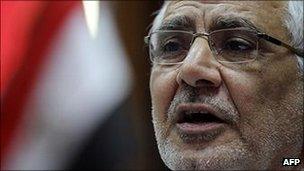Egypt candidate: Moderate Islamist, Abdul Moneim Aboul Fotouh
- Published

Abdul Moneim Aboul Fotouh was a prominent figure within Egypt's Muslim Brotherhood but was forced to leave after he declared his intention last year to stand for the presidency.
At that stage, the mainstream Islamist group, which was keen to show it did not seek to monopolise the new political scene, had said it would only nominate candidates for the parliamentary vote.
Dr Aboul Fotouh, a respected moderate who is head of the Arab Medical Union, decided to run for office as an independent.
Speaking to a crowd of thousands of supporters after handing in his candidacy papers in early April, he presented a presidential platform focusing on social justice with plans for development and security.
"We can realise our dreams and the co-operation of the great Egyptian people," he said, promising to make use of the country's "most valuable source of wealth", human potential, if elected.
"Let us work as groups, not as individuals, the era of the all-inspiring president and all-knowing leader is over," he added.
His plans include establishing a minimum standard income, restoring security within 100 days of taking office, re-equipping the Egyptian military from sources not funded by the United States and appointing a young vice-president, aged under 45.
The 60-year-old doctor is popular with young Egyptians and uses social media to communicate with them.
He has attracted the support of many Muslim Brotherhood youth who have grown weary of the group's hierarchical structure and hostility to change.
This remains a source of contention with the Brotherhood leadership. It has now put up its own presidential candidate and demands that members of the group support him.
Challenging authority
The doctor's own generation helped revitalise political Islam and the Brotherhood as student activists in the 1970s.
In 1977, when he was leader of Cairo University's Student Union, Abdul Moneim Aboul Fotouh became famous after confronting President Anwar Sadat in a public debate.
He openly criticised the restrictions on campus protests and Muslim preachers, making the president angry about his lack of respect.
The young Islamist was to end up in jail for the first time, along with hundreds of Sadat's opponents, just a month before the president was assassinated in 1981.
He was imprisoned again by President Hosni Mubarak from 1996 to 2001 in a crackdown on the Brotherhood, and was detained for several months in 2009.
Ideological evolution
In his recent memoir, A Witness to the History of Egypt's Islamic Movement, Dr Aboul Fotouh recalls the intransigence of his own conservative religious beliefs in the early '70s.
As a co-founder of the first cell of the Islamic Group (al-Gamaat al-Islamiyah) he believed that violence was permissible to spread the message of Islam and establish an Islamic state.
Looking back now, Dr Aboul Fotouh condemns the group's members for their intolerance and "intellectual terrorism".
He stresses how his contact with Muslim Brotherhood leaders moderated his views.
He was among many Islamic Group members who broke away to join the older organisation.
Leading man
The doctor was to serve on the 16-member Guidance Bureau of the Brotherhood from 1987 to 2009.
Increasingly he had become one of its most liberal and democratic voices, at times contradicting official views.
He said, for example, that women and Copts should have the right to run for the presidency in Egypt.
In 2010, he called for the Brotherhood to boycott the rigged parliamentary elections.
He supported the Egyptian uprising from early on, exhorting Western powers not to fear an Islamist takeover.
"Contrary to fear-mongering reports, the West and the Muslim Brotherhood are not enemies," he wrote in the Washington Post.
Presidential campaign
Dr Aboul Fotouh has been an outspoken critic of the military, which took over from Mr Mubarak.
As well as changing its funding if elected, he has pledged retrials for the thousands of Egyptians who were subject to military trials since the 2011 uprising.
At his 2 April campaign rally he also promised to appoint advisors in all fields and to fill 50% of administrative posts with people under the age of 45.
Other promises on the election programme include establishing an independent body to combat all kinds of discrimination, ensuring that educational curricula include all social groups - such as Copts and Nubians, for example - and passing a law to regulate the building of houses of worship.
Christians complain that a presidential decree is currently required to build new churches, whereas there is not the same restriction on new mosques.
Previously, the doctor has spoken of health insurance as a "basic right" and said that he would develop tourism to boost the economy. During a BBC Arabic interview he said that Islam did not require restrictions to be imposed on non-Muslims, such as holiday makers, drinking alcohol.
In the same interview, he commented on the peace treaty with Israel, saying it was being given excessive attention and that the future of Egypt did not depend on it.
Although Dr Aboul Fotouh remains one of the favourites running in the presidential contest, he has had to overcome many trials.
In February, he was violently beaten and had his car stolen by armed men on the Cairo ring road. He believes the attack was politically motivated.
Rumours that he held a foreign passport that would have disqualified him from being president have been vigorously denied.
- Published10 March 2012
- Published24 February 2012
- Published15 June 2011
- Published10 February 2010